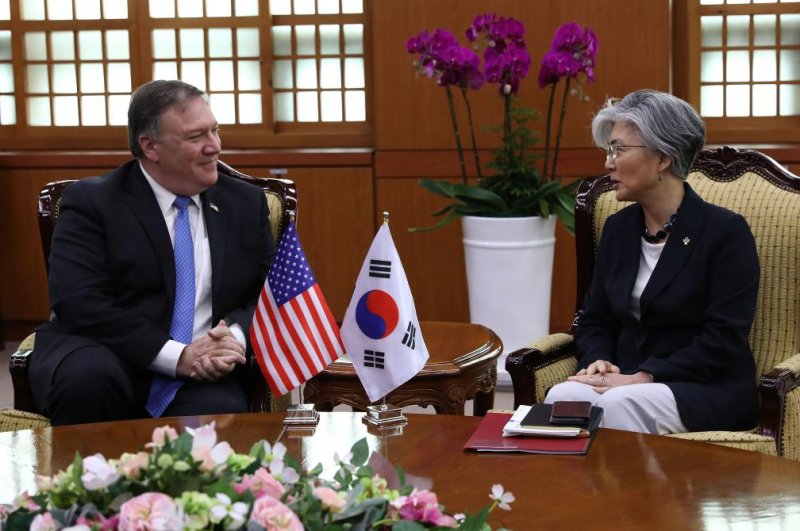U.S. Secretary of State Mike Pompeo (L) talks with South Korean Foreign Minister Kang Kyung-wha (R) during their meeting at foreign ministry in Seoul on Thursday. Photo by Chung Sung-jun/EPA-EFE
June 18 (UPI) -- U.S. Secretary of State Mike Pompeo will "soon" meet with North Korean officials, South Korea's foreign minister said Monday.
Kang Kyung-hwa, who had exchanged a phone call with Pompeo following his visit to Seoul last week, did not specify the date of the next U.S.-North Korea meeting, but said the talks will take place in the near future, Money Today reported.
Kang said she is not aware of the specific details regarding a hotline between U.S. President Donald Trump and Kim Jong Un.
Last week Trump told reporters he gave Kim a "very direct number."
"He can now call me if he has any difficulties [or] I can call him," Trump said.
The real work of denuclearization is expected to occupy U.S. and South Korean officials in the weeks ahead.
The Stockholm International Peace Research Institute said in its annual report released Monday that North Korea retains about 10-20 nuclear warheads, as of January.
SIPRI stated North Korea is one of nine countries that are nuclear weapon states. The others are
India, China, Pakistan, Israel, Britain, France, the United States and Russia.
North Korea's arsenal is estimated to be relatively small, compared to China at 280 warheads, India at 130-140 and Pakistan at 140-150.
SIPRI stated the United States and Russia are the two of the world's largest nuclear powers, and the United States has decreased its warhead count to 6,450 from 6,800 in 2017, and Russia reduced weapons from 7,000 to 6,850.
North Korea has agreed to "denuclearize" but verification of denuclearization is expected to present significant challenges.
Ahn Jin-soo, formerly of the Korea Institute of Nuclear Nonproliferation and Control in South Korea, said it is difficult to detect the presence of highly enriched uranium facilities because the facilities are small in scale.
Even if North Korea discloses additional enrichment facilities, the existence of undisclosed facilities will continue to be an issue, he said.















